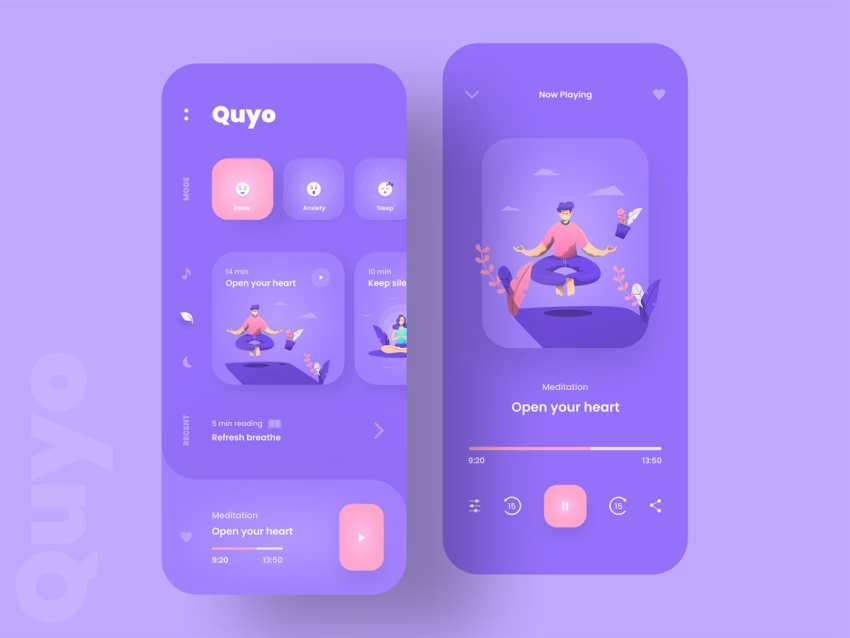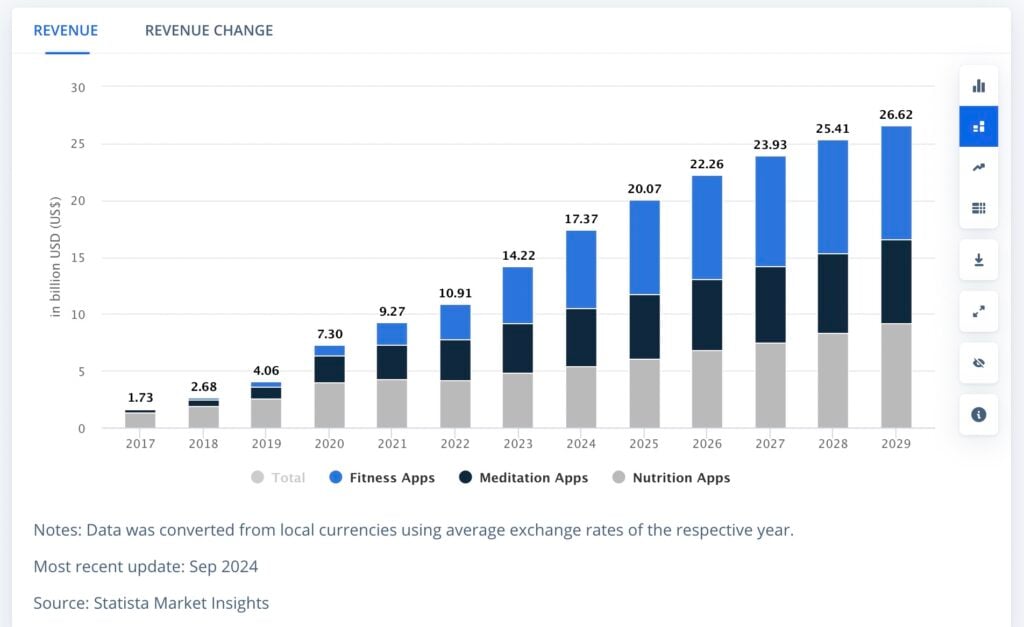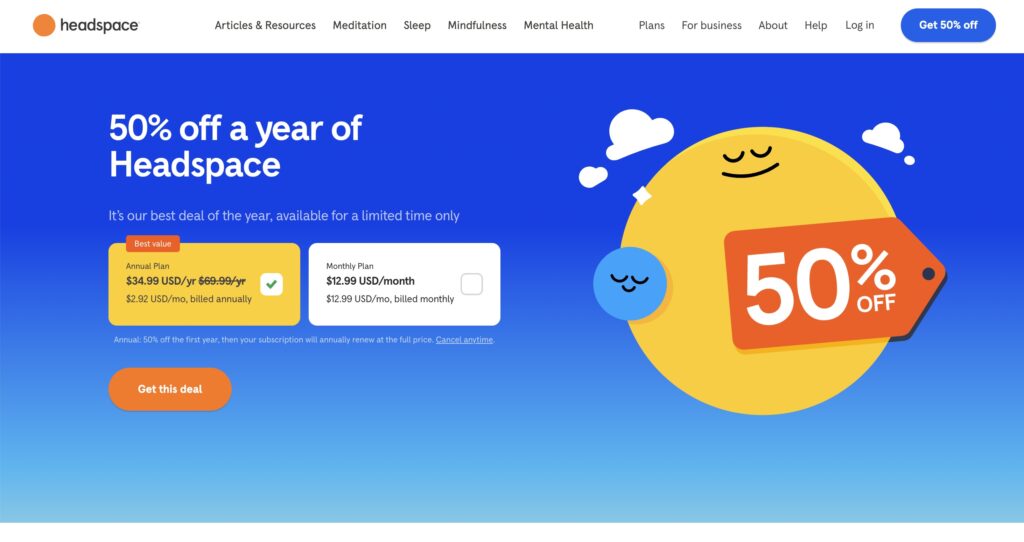
How to Create a Wellness App like Headspace?
Are you wondering how to create a wellness app?
The digital fitness app market is continuously expanding, and the revenue of the wellness app market is expected to reach the value of 47.70 billion USD in 2027, with a CAGR of 15.16%, according to a Statista research report.
According to Statista, revenue in the Health & Wellness coaching market is projected to reach US$17.37bn in 2024.

The market segment includes fitness apps, health monitoring apps, nutrition apps, workout apps, meditation apps, physical activity tracking apps, etc.
The fitness applications and their popularity among the masses to look after their health in an otherwise unhealthy lifestyle today offer numerous opportunities to business owners looking to invest in the growing market. Let’s see how you can create a wellness app and mark your share in the profitable industry.
Create a Wellness App like Headspace

Headspace is a mobile app that helps users improve their mental health through guided meditation, mindfulness, and guidance for cultivating life-changing habits. The app helps people reduce stress in extreme situations, improve their sleep quality, and focus on tasks for increased productivity.

Get a complimentary discovery call and a free ballpark estimate for your project
Trusted by 100x of startups and companies like
Headspace offers mindfulness practicing options like daily meditation, sleep meditation, stress and anxiety relief, meditation for kids, etc. The app offers a 14-day free trial period. Users can opt for monthly or yearly subscriptions to avail app's services for their mental health support.
There are other great wellness and meditation apps on the market:
- The Mindfulness App(meditation, sleep and relaxation app, with more than 500 courses, guided meditations and sleep stories).
- Calm app(popular app for sleep, meditation and relaxation).
- Healthy Minds Program app(top meditation and wellness app).
- Buddhify app(more than 200 guided meditations).
You can create a wellness app like Headspace by going through the following steps:
1. Research your Wellness App Idea and Decide on the Project Scope
You would research the mental health app market to analyze the feasibility of your wellness app idea. You need to analyze the competitor applications, end user demographics, limitations in the current mental wellness apps, and app users’ expectations.
You would need to finalize how your wellness app will address users’ concerns. You would validate your proposed app solution against market risks and decide on the features of your wellness application.
A mental wellness application has the following key features:
User Sign Up/In: A simple app registration process lets users sign up through an email address or a social media account, like Google or Facebook. A simple sign-in feature allows users to use an app without entering their credentials on every app visit.
User Profile: User can save their basic profile details and health progress, bookmark wellness content for later, invite friends, etc.
Content-Base: A mental health knowledge base, including articles, audio clips, and video tutorials on meditation, mindfulness exercise programs, stress management activities, mental health tips, etc. This also includes courses on mental health activity with various difficulty levels and time durations.
Push Notifications: This feature is necessary to keep users active on your app. You can send personalized messages, app alerts, daily health tips, etc., that compel users to click and engage with your wellness app. Personalized push notifications can improve your user retention rate by 93%.
Social Media Integrations: Today, users are fond of sharing their life updates on social media. Wellness app integrations with social media platforms, like Facebook, Instagram, Pinterest, etc., allow users to share your app content and mental health journey with their social media contacts. 59% of the world's population now uses social media, with an average daily use of around two and a half hours.
Gamification: Gamification features like leaderboard, progress bars, achievements, etc., keep users engaged with app content. Research shows that the gamification feature drastically increases user engagement by 48% which ultimately increases user retention rate, return on ad spent (ROAS), etc.
Payment Gateway: A robust payment gateway integration allows app users to seamlessly make in-app purchases and subscribe to services. 73% of US shoppers use a digital card to make online purchases via mobile apps.
2. Create a Wellness App Development team
You require a professional app development team to create a feature-rich, secure, and scalable wellness app. You would need the following roles in your team:
- A UI/UX designer designs an interactive and intuitive app user interface.
- An iOS developer makes mobile apps for iOS mobile devices.
- An Android developer creates apps for Android phones.
- An application tester conducts a quality assurance process for mobile apps.
- A professional mental health expert helps you add credible and authentic mental wellness content to your application.
- A business analyst with experience in the health mobile app industry studies the user market and explores business development opportunities.
- A project manager manages the entire app development process, team members, etc.
3. Select App Development Methodology
Your development team would need to follow a software development methodology to develop your wellness app. A software development methodology refers to a series of processes to define, design, develop, test, and deploy a software product.
We would advise you to form a scrum team to create your wellness app. Scrum teams can improve their productivity by 300% to 400%.
Scrum, an agile development and project management framework, helps developers accelerate the mobile application development process with quick time-to-market, smaller development iterations, close collaboration with end users, etc.
A scrum master (project manager) manages your developers/testers and maintains close communication between team members in sprint planning, task assignments, etc. Moreover, the scrum team conducts daily standup, weekly scrum, and retrospective meetings to discuss overall project progress, team members’ performance, lessons learned from mistakes, etc. 87% of scrum teams hold a daily scrum meeting for better performance.
Hire expert developers for your next project
1,200 top developers
us since 2016
You can read our article on best project management frameworks for more details.
4. Provide Software Application Infrastructure
The next step is the provision of software app development infrastructure to your development team, including backend support, memory management, security frameworks, database solutions, etc.
Cloud computing is popular among software business owners due to its various benefits. Some include easy access to cutting-edge technologies, fast setup, minimum startup costs, no maintenance expenses, etc. 80% of companies have reported improvement in operations within a few months after cloud adoption.
For example, you can opt for Microsoft Azure, a leading cloud computing service, and take advantage of the following advantages among others:
- Your developers can use Azure Functions as a serverless backend of your wellness app with low code writing and underlying infrastructure maintenance requirements. Azure provides all the required updates and keeps your application running.
- You can utilize Mobile Apps, a more comprehensive cloud platform that offers a backend server, data storage, offline data synchronization, user authentication, push notifications, etc., to accelerate your wellness mobile app development.
- Azure Disk Storage service offers you durable storage on the cloud for a high-performance and business-critical application.
5. Design your Wellness App
Your UI/UX designers would design your wellness app's frontend layout and UI components. They would decide on UI elements placements, typography, color palette, etc.
UI/UX designers need to design the app user interface according to UI principles, such as consistency, minimalism, uniformity, etc. They should also follow user experience practices to produce an intuitive and easy-to-navigate app user interface. For example, your design team can follow Human Interface Guidelines to design iOS apps and Material Design Guidelines for Android apps.
Your app designers would create low-fidelity wireframes that explain each app screen design in a logical order and high-priority prototypes that describe visual details, the functionality of each app component, etc.
Designers use tools like Figma. Figma can help your UI/UX designers via the following features:
- Figma is a browser-based design tool that makes it platform-independent. Your designers can access it from any device and location and also collaborate on the same design document.
- Your designers can utilize a range of prototyping features like overlays, animation, screen presets, etc. They can also test app prototypes on mobile devices using the Figma Mirror app.
- The Figma inspection tool makes it easier for designers to extract CSS and HTML code for design components. Your developers would not require a separate code handoff tool.
6. Create your Wellness App as an MVP
Your mobile app developers should create the front end and back end of your mobile application according to your decided specifications and design prototypes. We would suggest you build a minimum viable product for your wellness application.
A minimum viable product or an MVP has all the essential features to deliver the core functionality of your software product. An MVP helps to validate your app idea in the user market. It improves in successive development stages per user feedback.
You can opt for two types of mobile applications: native apps, and hybrid apps.
Native App Development
A native app is for a specific device. Native apps use device-specific hardware and software features like GPS, camera, processor, etc., and give optimized user experience and app performance.
The two leading mobile operating systems are Android and iOS, with 71.8% and 27.6% market shares, respectively. You would create separate apps for both mobile platforms.
Android Application Development
Your Android app developers would use the following tech stack:
- Java or Kotlin as a programming language, you can read our article for a detailed comparison between the two;
- Android Studio or Eclipse development IDE that helps code, compile, and test app code;
- Android SDK, a collection of development libraries, utilities, and tools like Android debug manager, Android device manager, etc., accelerates the app development process;
- Gradle, a build automation tool;
- SQLite, an open-source relational database technology;
- ML Kit by Google would make your wellness app more engaging through advanced app features based on machine learning algorithms, such as NLP-based chatbot support, personalized meditation courses, etc.;
- Features and APIs by Android for media controls, authentication, accessibility, push notifications, etc.
iOS App Development
Your iOS developers should be familiar with the following tools and technologies:
- Objective-C or Swift programming language, Apple recommends Swift for iOS app development. Our article on Swift vs. Objective-C gives a detailed comparison;
- Xcode, a development IDE integrated with compiler and source control, helps code and compile app code;
- RxSwift, a comprehensive reactive programming library;
- CocoaPods, a dependency manager;
- Parse manages backend storage, file management, auto-scaling, etc.
- APIs by Apple for push notifications, in-app payments, audio kit, video toolbox, etc.;
- Core ML, a machine learning framework, would help implement ML algorithms in your wellness app and build features like personalized app experience, perform data analytics, etc.;
- Core Data, a data persistence framework, and SQLite, Realm, etc., as database management systems.
Hybrid Fitness Application Development
Hybrid applications are cross-platform. Developers write code once and run it on every device. The app performance is not very optimized compared to native apps as the app code is not for specific hardware and software specifications.
Developers wrap code in a native container to run on a specific mobile operating system. Cross-platform tools can help your developers save 30% of the development time compared to native app development.
Hybrid app developers use the following development technologies:
Hire expert developers for your next project
- Standard web programming technologies, like JavaScript, CSS, and HTML5;
- App development frameworks, like Nativescript, Apache Cordova, Xamarin, etc.;
- Database technologies like Realm, SQLite, Amazon DynamoDB, etc.;
- Open-source libraries, like jQuery, moment.js, etc.;
- Cloudflare network for app security against DDoS and other cyber threats;
- APIs like Twilio SendGrid, Stripe, IBM MobileFirst, etc., for features like emails, in-app purchases, push notifications, etc.
7. Test your Application
Your app developers should write unit and integration test cases to test the functionality of individual code components and how accurately they interface with each other. Local test routines in Android Studio allow developers to perform unit and integration tests. Android Studio also supports a Java testing framework called JUnit.
Android offers you several libraries to run tests on android devices, including functional, performance, accessibility, and compatibility tests. Your testers can also use Espresso, an open-source UI testing framework, to test the application interface and interactivity.
Apple offers a comprehensive XCTest framework to test iOS apps. XCTest integrates smoothly with the XCode testing flow and allows testers to write unit and integration test cases, and perform asynchronous tests, performance tests, UI tests, etc.
Multiple open-source tools are available for testing hybrid mobile and web applications. For example, your developers can use Jasmine by IBM, expect.js, etc. Most hybrid testing tools help automate quality assurance routines to ensure app security, functionality, performance, scalability, etc.
You can consult our guide on how to write QA documentation for more information.
8. Deploy your Mobile App
Once you are satisfied with your application performance and are sure it meets its functional and non-functional requirements, your app developers would initiate the app deployment plan.
Your developers should follow DevOps practices to ensure faster delivery of your app features with continuous testing and performance monitoring and also to collaborate closely with each other.
Apple and Android provide app publishing guidelines. You can find them here and here. Your developers should ensure that your wellness application meets all the requirements and ranks successfully on Apple App Store and Google Play Store.
9. Monitor Progress and Provide Support
App store reviews and in-app surveys help gauge your wellness app performance among the target audience. You should collect user feedback and suggestions and improve your mobile app accordingly.
No mobile app survives without regular technical support. Your developers should follow a maintenance plan to periodically test your app and upgrade it with new software versions, hardware updates, etc.
Ready to Create a Wellness App?
You require a professional team of software app developers and project managers to deliver a wellness app that makes its mark in the competitive mobile app landscape.
If you, as a business CEO or CTO, do not find expert talent on your team, we would advise you to partner with a software development company with experience in mobile application development.
Why not hire software engineers from the field-expert software developers and project managers community at DevTeam.Space? All our developers are vetted for their software development skills and have experience developing software solutions for multiple industries.
You can partner with these software developers by sending us your initial project specifications. One of our account managers will get back to you to discuss further details on how we can help you create a wellness application.
FAQs on How to Create a Wellness App
You would need to perform a market analysis to validate your own workout app or fitness app idea and understand end-user requirements. Next, you would decide on application specifications, monetization strategy, marketing techniques, etc. You would require a team of fitness app developers and testers to build a competitive app. Your app development team would design, develop, test, and publish your health app.
The actual cost of a fitness application, workout plan app, or health app development depends on the complexity of your app features. Such apps for the fitness industry can cost anywhere from tens of thousands of dollars to a few hundred thousand dollars. You can consult DevTeamSpace to get a more accurate estimate for your fitness app development.
A wellness app helps users adopt a healthy lifestyle through meditation, mindfulness, nutrition management, sleep therapy, etc. A free fitness app for mental and physical health has few features as compared to paid apps.


